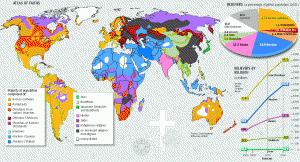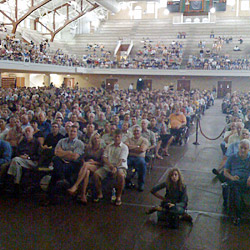by
Michael Shermer, Aug 03 2010

To understand the lunatic rantings of Mel Gibson you need know only a few core characters of the man, starting with his first name, which comes from Saint Mel (or Moel), a fifth-century Irish saint who worked to evangelize Ireland in the name of the Papacy. Saint Mel is the patron saint of the Roman Catholic diocese of Ardagh, where Mel Gibson’s mother came of religious age.
The young (modern) Mel was brought up by his Traditionalist Catholic father, Hutton Gibson, where the doctrine of “Extra Ecclesiam nulla salus” (“Outside the Church there is no salvation”) was preached. Of course, what constitutes “the church” determines the circumference of the salvation circle, with religious liberals opting for those who accept Jesus as their savior as eligible for salvation, while religious fundamentalists, literalists, and apparently traditionalists holding to the strict dogma that if you are not Catholic you are not saved. Here is what Mel Gibson once said about his own (apparently long-suffering) wife Robyn, who is an Episcopalian: “There is no salvation for those outside the Church … I believe it. Put it this way. My wife is a saint. She’s a much better person than I am. Honestly. She’s… Episcopalian, Church of England. She prays, she believes in God, she knows Jesus, she believes in that stuff. And it’s just not fair if she doesn’t make it, she’s better than I am. But that is a pronouncement from the chair. I go with it.” The Chair. That’s refreshing. Here’s a bumper sticker for Saint Mel’s car: The Pope Said it, I believe it, That Settles it. Continue reading…
comments (129)
by
Michael Shermer, Apr 20 2010
On April 10 the Wall Street Journal published a debate between myself and Gregory Paul on the question of whether or not belief in God is innate. Here are the links to the two articles:
http://tinyurl.com/y8n7qg6
http://tinyurl.com/y52ckwf
The online version was well edited but shorter than my original draft, which I present here just for the record. Enjoy.

According to Oxford University Press’s World Christian Encyclopedia, 84 percent of the world’s population belongs to some form of organized religion, which at the end of 2009 equals 5.7 billion people who belong to about 10,000 distinct religions, each one of which may be further subdivided and classified. Christians, for example, may be aportioned among 33,820 different denominations.1 Among the many bionomial designations granted our species (Homo sapiens, Homo ludens, Homo economicus), a strong case could be made for Homo religiosus. And Americans are among the most religious members of the species. In a 2007 Pew Forum survey of over 35,000 Americans, the following percentages of belief were found: Continue reading…
comments (76)
by
Daniel Loxton, Mar 05 2010
Even before I started writing Evolution: How We and All Living Things Came to Be I knew that it would very briefly mention religion, make a mild assertion that religious questions are out of scope for science, and move on. I knew this was likely to provoke blow-back from some in the atheist community, and I knew mentioning that blow-back in my recent post “The Standard Pablum — Science and Atheism” would generate more. And, I should have realized that I was muddying the water by packaging multiple related issues together in one post: the specific wording of a passage in my book; the question of whether that passage should have been included; and, the wider question of how science and skepticism relate to atheism.
Still, I was surprised by the quantity of the responses to the blog post (208 comments as of this moment, many of them substantial letters), and also by the fierceness of some of those responses. For example, according to one poster, “you not only pandered, you lied. And even if you weren’t lying, you lied.” (Several took up this “lying” theme.) Another, disappointed that my children’s book does not tell a general youth audience to look to “secular humanism for guidance,” declared that “I’d have to tear out that page if I bought the book.” Continue reading…
comments (97)
by
Michael Shermer, Jan 12 2010
Nothing fuels religious extremism more than the belief that one has found the absolute moral truth. Islamic terrorism, for example, has gradually shifted from secular motives in the 1960s to religious motives today. A 2000 study by the state department that resulted in the publication Patterns of Global Terrorism, found that in 1980 there were only two out of sixty-four militant Islamic groups whose mission was religiously based. In 1995 that figure had climbed to nearly half. The figure is undoubtedly higher today. (http://fpc.state.gov/documents/organization/54249.pdf)
It is a type of fuel that can lead to what Clay Farris Naff, Executive Director of the Center for the Advancement of Rational Solutions in Lincoln, Nebraska, cleverly calls the “neuron bomb,” after its cold-war counterpart, the “neutron bomb,” designed to kill people while leaving buildings and infrastructure in tack. A schematic of the neuron bomb looks like this: Continue reading…
comments (52)
by
Michael Shermer, Dec 01 2009
Last week, while I was giving thanks for an abundance of family, friends, and food, a brouhaha was brewing over an invited opinion editorial I wrote for CNN celebrating the 150th anniversary of the publication of Charles Darwin’s On the Origin of Species (on Tuesday, November 24).
The title, “Religion, Evolution can Live Side by Side,” was written by the CNN editors, but it does capture the thrust of the piece which I concluded by noting that if you are a believer in an eternal god, what difference does six zeros make on when the creation happened — 10,000 or 10,000,000,000 years ago — or by what method of creation was used: spoken word or big bang?
Well, this set off a mild firestorm among some observers of the science-and-religion debate, most prominently the estimable Jerry Coyne, the author of one of the best books ever written on the subject, Why Evolution is True, in his website of the same title called me an “accommodationist” and even a “faitheist” (“faith atheist”?) Continue reading…
comments (81)
by
Michael Shermer, Sep 08 2009
I believe in the power of science and humanity. Specifically, I believe that biodiversity is a good thing and that we have been rapacious in our treatment of the environment, although I think the environmental movement has greatly exaggerated our condition and that the environment is a lot more resilient than most environmentalists give it credit for. I don’t mind eating cows and fish, but dolphins and whales have big brains and they’re cool, so I don’t think we should kill them. I drive an SUV because I haul around bicycles, books, and dogs, but as soon as there is a bigger hybrid, I’ll buy it. And although I am a libertarian heterosexual who is about as unpink (in both meanings) as you can get, I believe people should have an equal opportunity to be unequal. As for evolution, it happened. Deal with it. Continue reading…
comments (128)
by
Michael Shermer, Aug 18 2009
Did humans evolve to be religious and believe in God? In the most general sense, yes we did. Here’s what happened.
Long long ago, in an environment far far away from the modern world, humans evolved to find meaningful causal patterns in nature to make sense of the world, and infuse many of those patterns with intentional agency, some of which became animistic spirits and powerful gods. And as a social primate species we also evolved social organizations designed to promote group cohesiveness and enforce moral rules.
People believe in God because we are pattern-seeking primates. We connect A to B to C, and often A really is connected to B, and B really is connected to C. This is called association learning. But we do not have a false-pattern-detection device in our brains to help us discriminate between true and false patterns, and so we make errors in our thinking Continue reading…
comments (138)
by
Yau-Man Chan, Aug 16 2009
Last year, during the presidential campaign, “Obama is the Antichrist” websites started popping up all over the Internet. My email address must have been poached by one the many “End Times” ministries as I found myself mercilessly spammed by their proselytizers and my email filter had to work overtime to keep up. Eventually this wave of lunacy subsided and the Nigerian 419-scam-mails reclaimed their rightful place as the dominant bandwidth consumer of my Junk Mail Universe.
Then, a couple of weeks ago, another Obama-is-the-Antichrist campaign started up again. This time it came in the form of a viral YouTube video which claims that Jesus was quoted in the Gospel according to Luke to have revealed the name of the Antichrist. This a accomplished with the help of some cryptic association of the president’s first and last name when rendered in Aramaic, combined with bad Hebrew pronunciation, gleamed from a text written in Greek. I will leave it up to Mike Heiser, host of the PaleoBabble blog, Academic Editor for Bible Study Magazine, who is no fan of the President but has expertise in Hebrew and Aramaic to debunk this latest bunk. Continue reading…
comments (37)
by
Michael Shermer, Jun 23 2009
An ironic coincidence — on Monday, June 15, I read two articles back-to-back: Andrew Newberg’s op ed piece in USA Today entitled “This is Your Brain on Religion” and Jeff Sharlet’s cover story for the May issue of Harper’s magazine, “Jesus Killed Mohammed: The Crusade for a Christian Military.”
Newberg is a neuroscience specializing in “neurotheology”, or the study of what happens to your brain when you do religious things, like pray, or think spiritual thoughts, or read scripture, or listen to a sermon. Newberg begins by recounting that in high school he had a Christian girlfriend (he is Jewish) whose family called themselves “born-again Christians”. Although they were always pleasant to him, “they were quite clear that in their view I had deeply sinned by not turning to Jesus. Oh, and because of this, I was going to hell.” That’s nice. Continue reading…
comments (28)
by
Michael Shermer, Apr 29 2009

Last night, April 28, 2009, I debated Hugh Ross and Fuz Rana from Reasons to Believe (RTB), an evangelical Christian organization whose mission it is to give people “reasons to believe” beyond the usual faith-based reasons. In this case, it is to scour the annals of scientific discovery in search of findings that seem to gel well with biblical passages; and even if they don’t seem to fit, these gentlemen are adroit at massaging both the research and the scriptures such that in the end they will fit come hell or high water.
I blogged about my previous debate with the RTB boys before, so I won’t repeat their arguments and my rebuttals here, but this was most definitely a larger venue and audience — the basketball arena at the University of Texas at Austin with over 3,000 in attendance — so I made sure that my presentation was especially poignant and lively (first and foremost, I believe, a public speaker must be interesting, have something to say, and say it in a manner that gets people to pay attention and remember). For example, I nailed Ross right off the bat on his claim that the RTB “day-age” model of creation is correct when he said that the use of the Hebrew word “yom” in Genesis means “epoch” (and therefore no matter what scientists discover about the age of the origins of life, the Earth, and the universe, they can say “see, our model predicted that correctly”). Continue reading…
comments (42)



